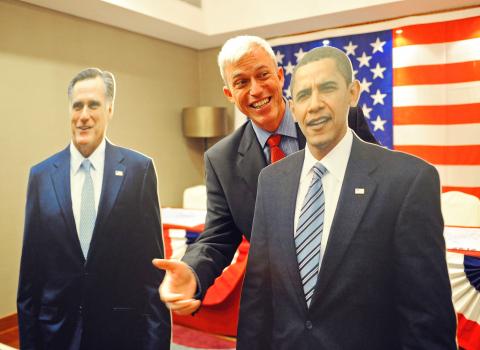|
Taiwan should aim to
be US’ Asia partner: experts
STRATEGIC: After the re-election of US President
Barack Obama, analysts said Taiwan should liberalize its economy and boost its
defense to benefit from the US’ Asia pivot
By Shih Hsiu-chuan / Staff reporter

A supporter of US President
Barack Obama yesterday stands behind a cardboard cutout of the president to
celebrate Obama’s victory at an election day party held at the American
Institute in Taiwan in Taipei.
Photo: CNA
With the US’ foreign policy in Asia
expected to stay stable for the next four years after US President Barack
Obama’s re-election yesterday, Taiwan should be proactive in adopting
initiatives to liberalize the economy and maintain its self-defense capabilities
to position itself as a key strategic partner for the US, academics said
yesterday.
At a forum held in Taipei, Edward Chen (陳一新), a professor at Tamkang
University’s Graduate Institute of American Studies, predicted the “continuity”
of Obama’s cross-strait policy, which “portrays Taiwan as its partner in
economic and security matters, despite pressure from China.”
Chen disagreed with the view that Obama has been soft on China over his four
years in power, saying that the US’ strategy of refocusing to the Asia-Pacific
region was aimed at counteracting the continued rise of China’s economic and
military power.
Under the Obama administration, the US has adopted a “multi-pronged approach” to
“make China feel fidgety” — by creating military alliances with Japan,
Australia, New Zealand, the Philippines and South Korea; establishing
partnerships with Vietnam, India and Taiwan; touting democratization in
Mongolia, Myanmar and Laos; urging Cambodia to strike a balance with China; and
pushing on with the Trans Pacific Partnership (TPP), Chen said.
Chen said Obama may declare China a currency manipulator, as stated in a new US
Department of Commerce report, the release of which he said was “put off until
after the election.”
Against the backdrop of contradiction and strategic anxieties in US-Sino
relations, Taiwan plays an important role in Obama’s strategic pivot to Asia
because “the US cannot afford having a breach in regional security,” he said.
Chen said Taiwan needs to “walk a fine line” in pursuit of rapprochement with
China because tilting too much toward Beijing could raise concerns in
Washington.
Joanne Chang (裘兆琳), a research fellow at Academia Sinica’s Institute of European
and American Studies, suggested President Ma Ying-jeou’s (馬英九) administration
prioritize Taiwan’s economic ties with the US when it handles cross-strait
relations during Obama’s second term.
The issue of US-Taiwan economic and trade cooperation should be handled “at a
national strategic level” to let the US understand that Taiwan’s economic
marginalization and its economic overdependence on China not only puts it at a
disadvantage when negotiating across the Taiwan Strait, but are also unfavorable
to the US, Chang said.
The US must give serious thought to helping Taiwan get out of this predicament,
she said.
In view of China overtaking the US as the largest trading partner of South
Korea, Australia, Japan and Thailand — countries with which the US has defense
treaties — the US’ rebalancing to Asia is not solely a military move, Chang
said.
Chang said it would be just a beginning that the US agreed to resume talks with
Taiwan under the platform of the Trade and Investment Framework Agreement (TIFA)
after a hiatus since 2007 caused by disputes over US beef imports.
It is imperative for Ma’s administration to work hard to win the support of both
the US Congress and the Obama administration for Taiwan’s access to the TPP and
to launch a feasibility study on a free-trade agreement (FTA) between the US and
Taiwan, she said.
Separately, Alexander Huang (黃介正), a political science professor at Tamkang
University, said in a telephone interview he expected the continuity of policies
from both sides dealing with the bilateral relationship, which has been “put
back on the right track” since Ma came into office.
“After we reap the fruits of the [inclusion of Taiwan into the US’] Visa-Waiver
Program — resuming TIFA talks and proceeding with several major arms sales — we
need to do something in the next four years … to demonstrate to the US that we
will be a positive partner in its Asia policy,” Huang said.
On the economic front, Taiwan has to make sure it will have successful dialogue
under the TIFA auspice, continue to liberalize its economy to make it eligible
to meet TPP requirements and work on signing an FTA with the US, Huang said.
Militarily, Taiwan needs to maintain and strengthen its self-defense abilities
as it prepares to transform its compulsory military service system into a full
volunteer force to reflect its strong resolve to be a US defense partner, he
said.
|
![]()
![]()
![]()